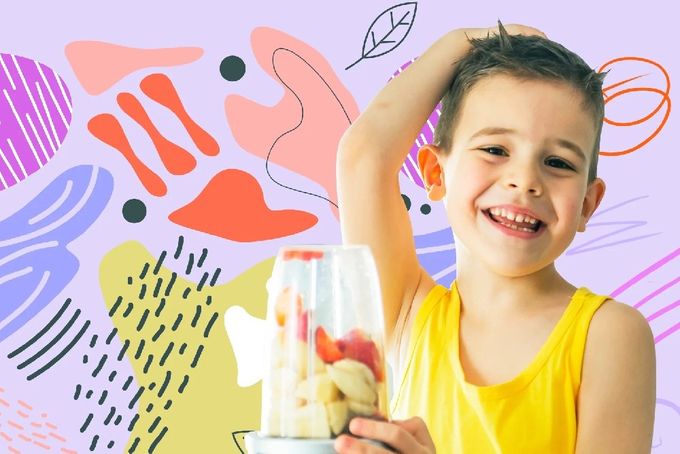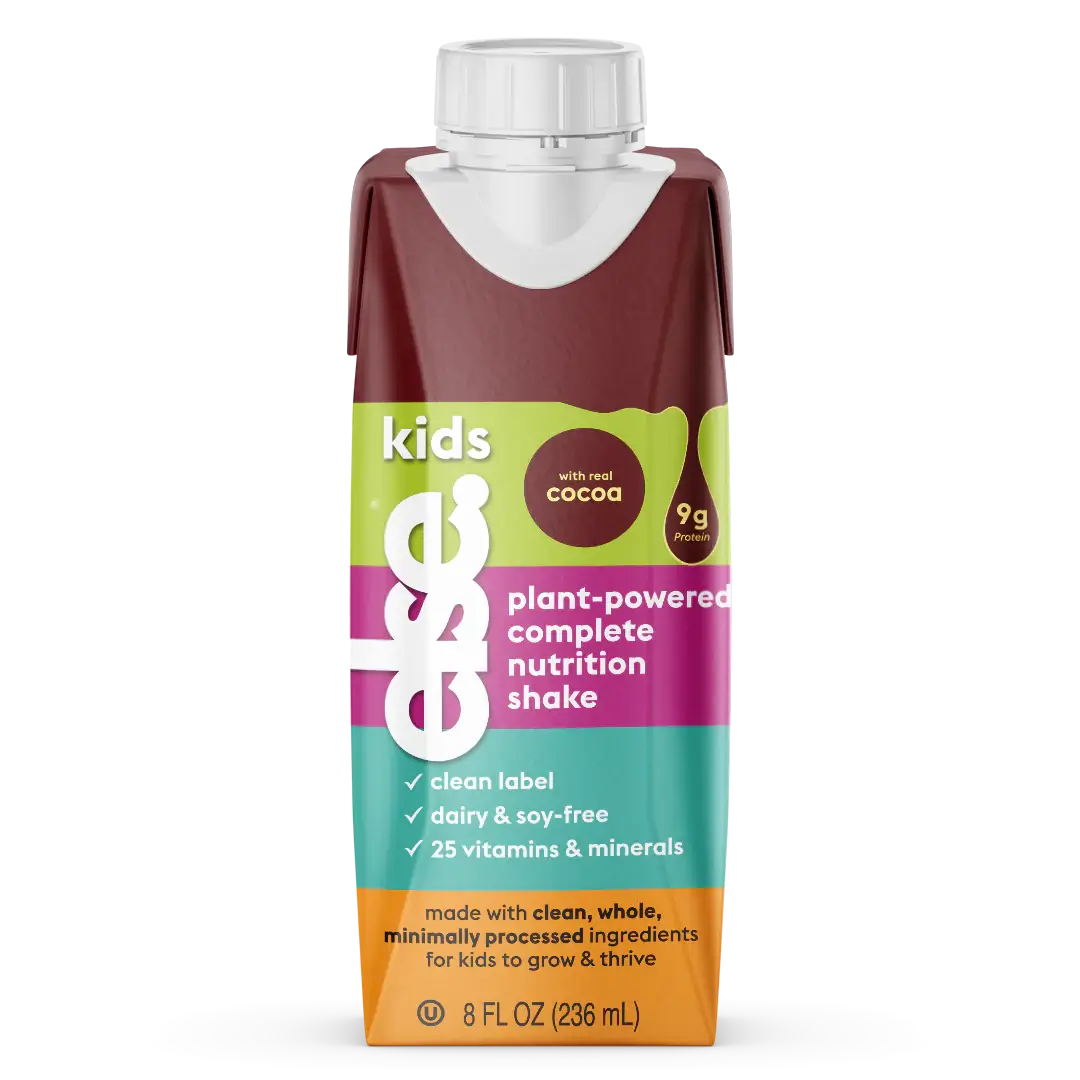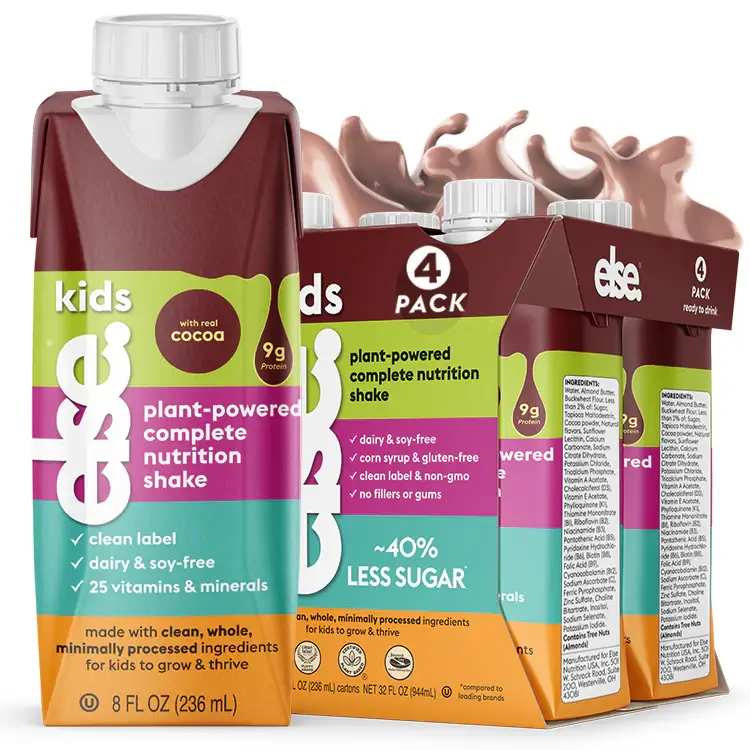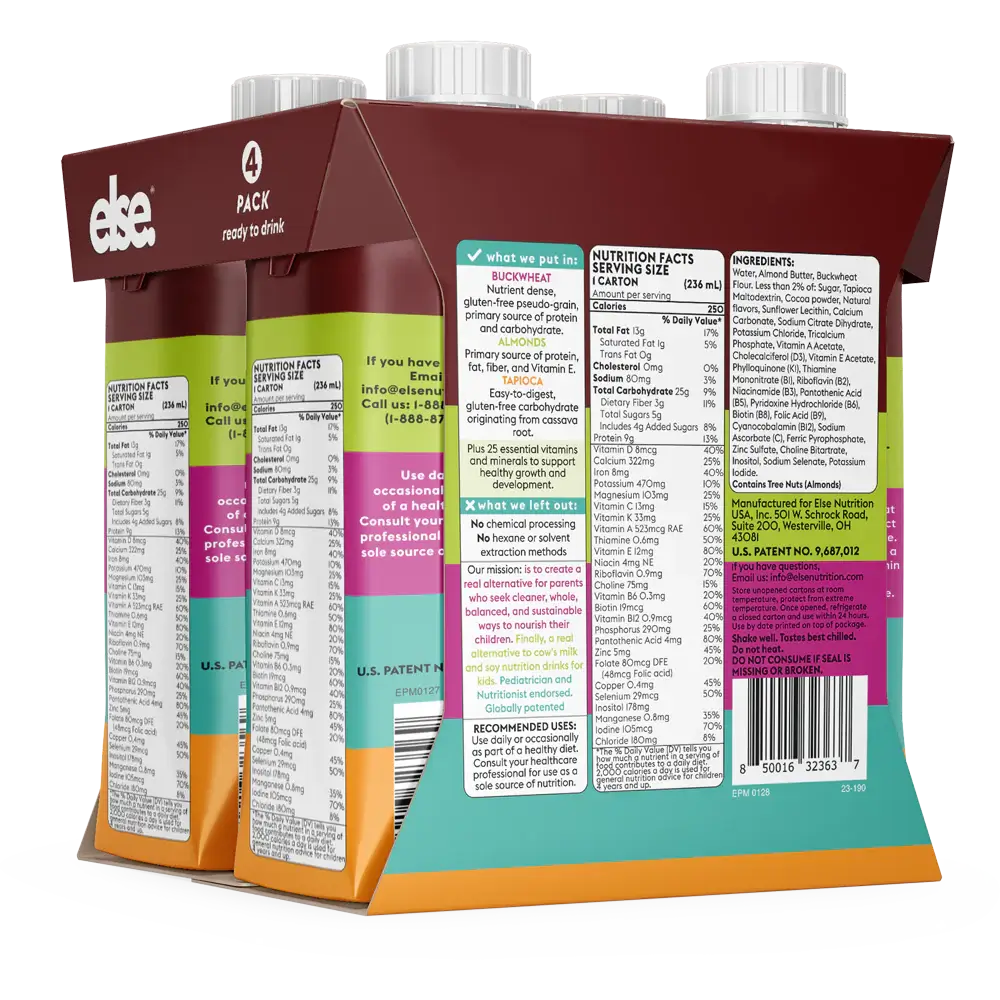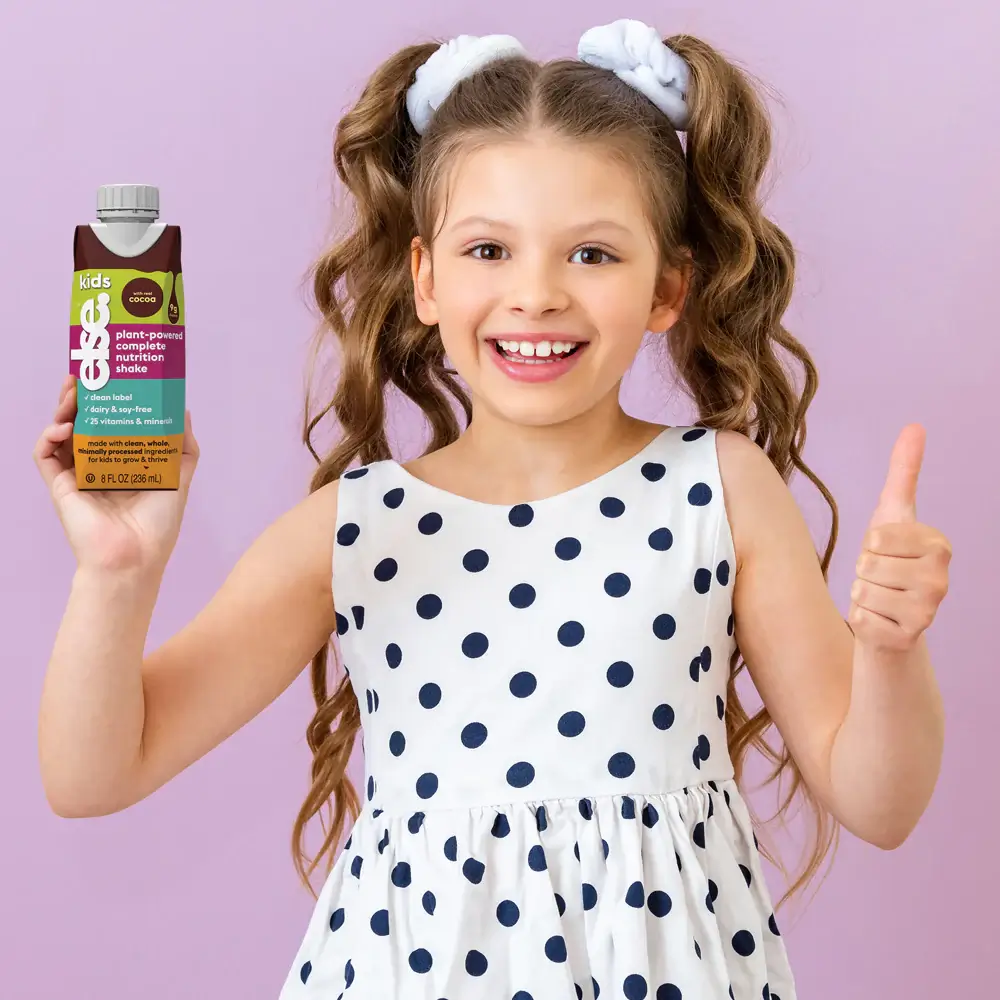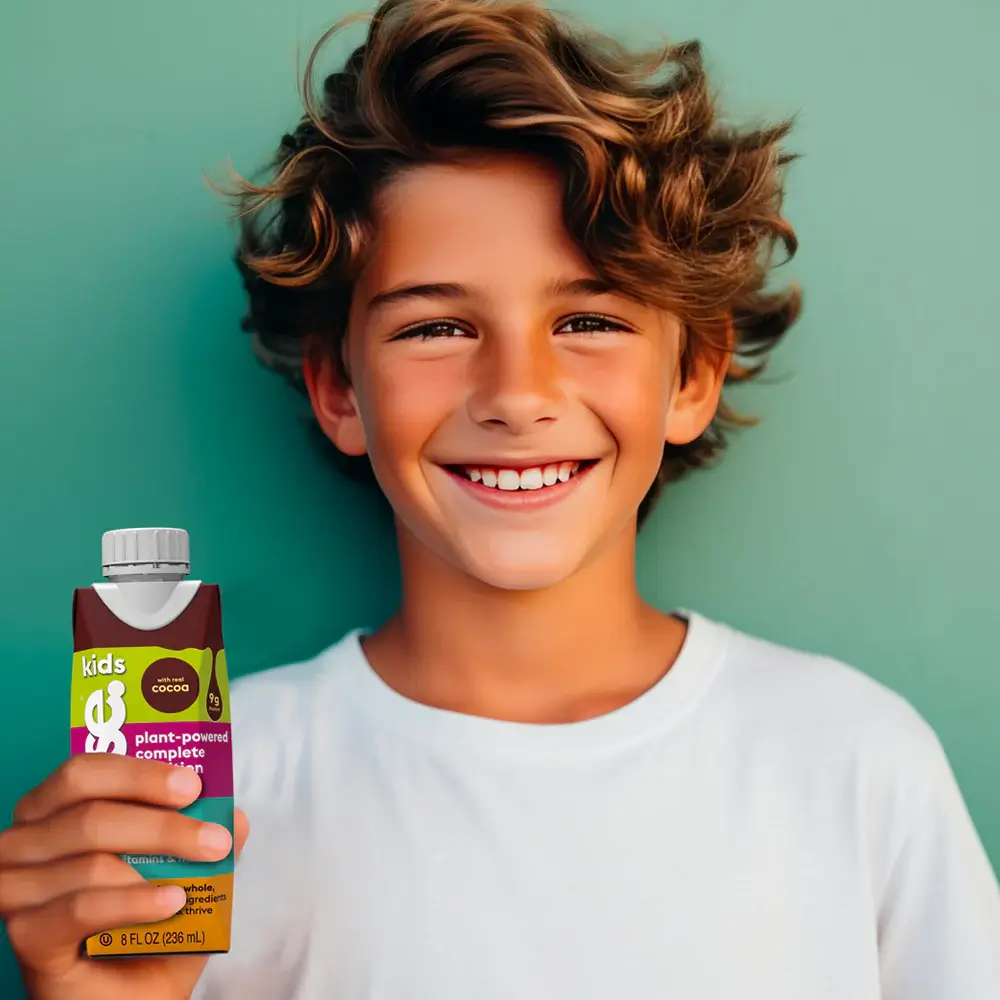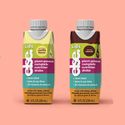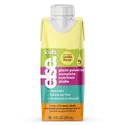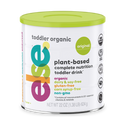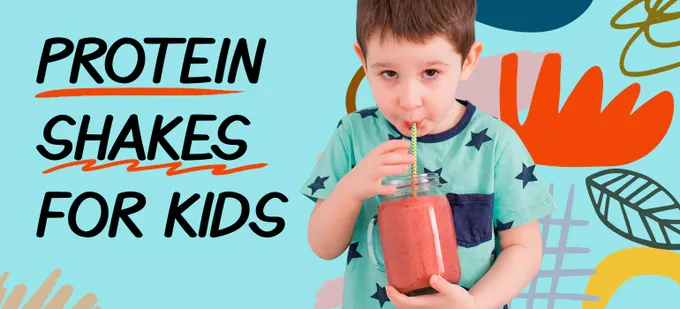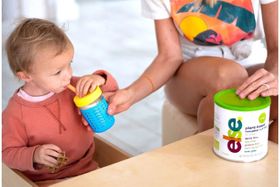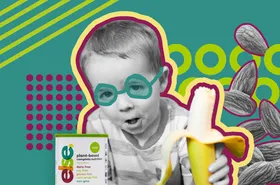Are Protein Shakes Good for Kids?
Updated June 11, 2024
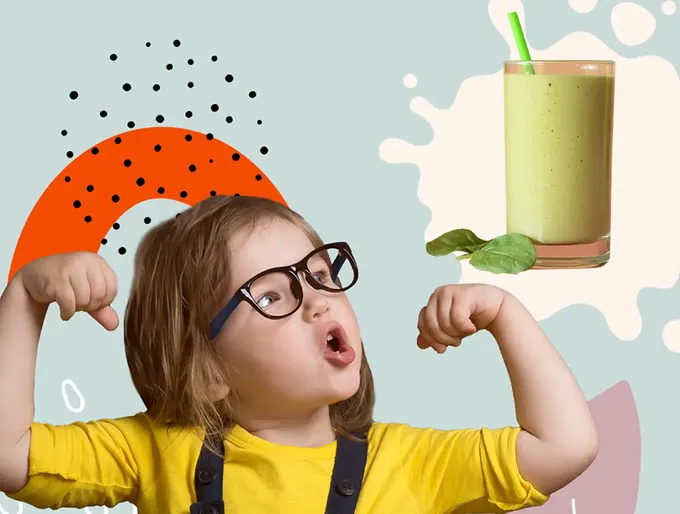
Curious if protein shakes are okay for kids? This article breaks down the pros and cons, giving parents the facts they need to decide what's best for their children's health.
Nutrition is a cornerstone of healthy child development. Protein, in particular, plays many essential roles in your child’s growth and health. From building new muscle to supporting the immune system, kids require protein for optimal health.
For children that may not be eating adequate amounts of protein, or for those that may need to gain weight, a protein shake can be used to boost protein intake and overall health.
» Ensure your child's adequate amount of protein with this plant based nutritional shake
About protein and protein shakes
Protein is a macronutrient that plays a vital role in growth and development. Proteins are the building blocks of body tissues. They help develop strong muscles and bones, keep the immune system healthy, and repair tissues in the skin, organs, hair, and nails. Proteins can also work as enzymes, hormones, and cellular messengers, all ensuring your body is functioning properly.
» Learn more about other important nutrients for your child
After the body digests proteins, it is left with building blocks called amino acids. Amino acids are released into the bloodstream. The blood carries them to cells in different parts of the body so they can start building muscle, repairing tissue and producing energy.
There are 20 different amino acids and they are classified into two main categories: essential and non-essential. The human body requires all of these amino acids in order to be healthy and functional.
Essential amino acids cannot be created by the body and must be obtained by eating certain foods. These nine amino acids include methionine, valine, tryptophan, isoleucine, leucine, lysine, threonine, phenylalanine, and histidine.
» If your child is allergic, read more about hydrolysed formula that is based on amino acids
Instead of storing these essential acids, the body uses them to create new proteins daily. Consequently, the body requires a consistent supply of essential amino acids to remain healthy.
Food sources that contain all nine essential amino acids are often referred to as complete proteins. Complete protein sources include meat, poultry, seafood, eggs, and dairy products.
Plant based complete protein sources include soy, quinoa, and buckwheat because they also contain all nine essential amino acids.
There are a wide variety of plant based protein sources like beans and nuts that are considered incomplete, as they may be deficient in one or more of the essential amino acids.
» Discover more plant based protein-rich foods and meal ideas
However, if you’re following a plant based diet, you can still get all of the essential amino acids if you eat a variety of plant based proteins every day.
The other types of amino acids are the non-essential ones which are synthesized by the body, and therefore don’t need to be included in a daily diet. The 11 non-essential amino acids include arginine, glutamine, tyrosine, cysteine, glycine, proline, serine, ornithine, alanine, asparagine, and aspartate.
Under normal circumstances, the body is able to produce non-essential amino acids and doesn’t require them from your diet. However, in times of illness or stress, the body requires increased levels of some of these amino acids. These amino acids are called “conditional” and include arginine, cysteine, glutamine, tyrosine, glycine, ornithine, proline, and serine.
Lack of protein in children
People of all ages require protein, but due to their rapid growth, kids need a significant amount for healthy development. From boosting the immune system to supporting cell growth throughout the body, protein sits at the driver’s seat of your child’s growth.
» Learn about all common nutrient deficiencies
While most children consume adequate amounts of protein, there are some circumstances in which a child may not be meeting their protein requirements. Some children may be picky eaters, while others may have nutrient deficiencies related to a chronic illness. Either way, a lack of protein may lead to health problems down the road.
Lack of protein in children may lead to the following health issues:
- Increased fatigue
- Decreased concentration
- Delayed growth
- Loss of muscle mass
- Bone and joint pain
- Poor wound healing
- Weakened immune system
Protein Shakes for Kids
Parents of picky eaters or those with children who have a need for increased protein, or weight gain, may consider providing protein shakes in an effort to ensure their children receive adequate amounts of this vital nutrient.
Protein shakes for kids can provide an easy and simple way to get the nutrients they may be missing out on from food. If homemade, protein shakes are also customizable and can be easily modified to satisfy even the pickiest of eaters.
Protein shakes for kids are not used to replace your child’s meals. Ideally, a protein shake would be given between meals rather than with meals. For example, you may give your child a breakfast consisting of whole foods and then provide a protein shake with Else toddler formula for their mid-morning snack.
Eating three consistent meals per day composed of a variety of foods is an important part of your child’s health. Whole foods can provide many important nutrients that support your child’s growth, health, and well-being.
Are protein shakes safe for kids?
You may be wondering if protein shakes are good for kids. If you choose to make your own protein shakes, you have complete control over which ingredients are included.
This means that you can tailor nutrients to meet your child’s specific requirements. If your child needs additional protein, or calories, you can safely provide them without giving too much or too little of a specific nutrient. This ensures that your child can drink protein shakes safely.
There are some drawbacks to providing a pre-made protein shake or protein powder for your child. Many of the pre-made protein shakes and protein powders contain too much sugar or contain artificial sweeteners. They also tend to be full of processed ingredients, artificial colors, and flavors, and they are rarely organic.
One 2015 review found that providing children with added protein powders may cause the following adverse effects:
- The powders may end up replacing a child’s regular food intake.
- This type of supplementation may prevent children from developing healthy eating habits.
- Protein powders may cause gastrointestinal distress, including bloating or diarrhea.
» Read more about reasons why you should avoid soy-based formulas and proteins
It is also important to note that protein powders are not regulated by the Food and Drug Administration (FDA), and can contain an assortment of additional ingredients. These additional ingredients may include chemicals that can be harmful for a growing child.
If possible, it’s best to make your own protein shakes to ensure optimum quality and safety. Else Nutrition's Ready to Drink Shakes are made with over 90% real, nutritious whole food ingredients. They contain 9g of pure, plant-powered protein per serving and are minimally processed, which makes them a perfect option for your toddler.
Should your kid use supplements?
In general, if your child is growing with consistency and eating regular, balanced meals, supplement use is likely unnecessary. Eating balanced meals will provide your child with the nutrition they require for their best growth and development.
» Unlock the secret to a nutritious, balanced diet with dietary supplements for kids
Whenever possible, it is ideal to get nutrition from whole food sources, such as whole grains, lean meats, dairy, fruits, vegetables, and beans.
If a child cannot eat a balanced diet related to a chronic illness, extreme pickiness, or food intolerance, supplementation may be helpful. Certain nutrition supplements may be needed for kids that are at risk for deficiencies, including kids that:
Follow a vegetarian or vegan diet
Kids who follow a plant based diet and eat no animal products may require additional calcium, iron, zinc, and vitamins B12 and D. Kids who don’t eat meat can also have lower protein levels and may benefit from having a protein shake.
» Uncover why plant based diets for kids are more than just a trend
Have gastrointestinal disorders like celiac disease, cystic fibrosis, or inflammatory bowel disease (IBD)
Kids with gastrointestinal disorders may have difficulty absorbing several vitamins and minerals, including iron, zinc, and vitamin D. Kids with cystic fibrosis may have difficulty absorbing fat and, therefore, may have trouble absorbing the fat-soluble vitamins, including vitamins A, D, E, and K.
Are extremely picky eaters and struggle eating a variety of foods.
Prolonged picky eating can lead to malnutrition and vitamin and mineral deficiencies. Kids who are extremely picky may benefit from supplementation to ensure optimal growth and development.
Have fallen off the growth curve and are considered underweight.
There are many reasons why a child may not be growing at an ideal rate. If your child’s weight and/or height drops in percentiles from the growth cart, this may signify that they may not be eating enough calories or protein.
A child is considered underweight if they’re consistently in the bottom 5th percentile for weight compared to their height.
Regardless of the reason, underweight children who have fallen off the growth curve will likely benefit from some type of protein-calorie supplementation.
» Learn more about how much protein your child needs daily not to stay underweight
Have metabolic conditions that cause protein wasting like cancer.
Children with cancer may benefit from calorie and protein supplementation to prevent disease-related malnutrition.
It is important to note that dietary supplements are not tested and regulated like over-the-counter and prescription drugs.
According to the National Institutes of Health (NIH), dietary supplements can be poor in quality and contain a range of contaminants, including chemicals, drugs, or heavy metals.
Studies of dietary supplements have found significant differences between what’s on the label and what’s in the bottle, making them potentially dangerous for kids.
Additionally, many dietary supplements haven’t been tested in children. Since children’s bodies aren’t fully developed, there may be negative side effects that are harmful to kids.
» Learn more about signs that you should switch to soy-free formula
There are many protein powders on the market, mostly geared towards adults and some geared towards children. Protein powders generally contain protein from plant or dairy sources. Some examples include whey protein (milk-based), pea protein, and brown rice protein.
It is best to consult with your health care professional before giving your child any supplement, including any protein powder. If your child’s health care professional believes that a protein powder is necessary for your child, choosing a product that doesn’t contain added sugars, artificial sweeteners, or high doses of vitamins, minerals, or any other nutrient is ideal.
What side effects could there be from protein shakes?
Making your own protein shakes at home is your safest bet to ensure the quality of the protein shake. It is also likely that you won’t overload your child with too much of one nutrient when making your own shakes.
In the events that you are using pre-made shakes, or protein powder, there is the chance that your child could be receiving too much protein. Consequently, there may be side effects that your child might experience as a result of having too much protein.
They are as follows:
Extra protein can lead to weight gain
Unnecessary protein intake can lead to extra fat storage, and not necessarily additional muscle mass. Moreover, a child may experience weight gain from the excess calories and sugar the pre-made shakes and powders contain. Recent studies have shown that there is an association between high protein intake in early childhood and obesity later in life.
» Ensure your child is gaining healthy weight with this nutritional shake
Organ damage
Excess protein intake can contribute to dehydration and lead to kidney damage. Increased protein intake can also lead to an increased excretion of calcium which places some children at risk for kidney stones. Excess protein intake may also strain a child’s liver, making it harder for their bodies to process waste and toxins.
Potential for nutrient deficiencies
If protein shakes are used to replace regular meals, a child may not be receiving the necessary nutrition they need from other whole food sources.
Supplements may not benefit kids with chronic diseases
In one review, researchers evaluated the evidence surrounding the effects of protein supplementation in kids with various chronic diseases, including cancer and cystic fibrosis. Unfortunately, this study did not find improvements in weight, height, or nutritional status in kids with these chronic illnesses.
» Learn about the symptoms of celiac disease in kids
How much protein does your kid need?
Your kids’ protein needs can vary, depending on their growth and activity level. Kids who are going through a growth spurt, or those who are more active, may require additional protein to meet their nutritional needs.
Ideally, protein should make up 15 percent to 20 percent of a child’s daily calorie intake. A general rule of thumb is that kids need about half a gram of protein for every pound that they weigh. For example, a 40-pound child should have around 20 grams of protein each day.
The 2015–2020 dietary guidelines from the Department of Agriculture recommend that babies, children, and teens get the following amounts of protein each day:
- 1-3 years: 13 grams
- 4-8 years:19 grams
- 9-13 years: 34 grams
- 14-18 years (female): 46 grams
- 14-18 years (male): 52 grams
It may be tricky to determine how much protein your child is eating throughout the day. One way to simplify things is to understand the protein content of certain protein-rich foods. For example, one ounce of a protein-rich food provides approximately 7 grams of protein. An ounce is equal to:
- 1-inch cube of cheese
- 1 cup of milk
- 1 tablespoon of peanut butter or nut butter
- 1 ounce of meat, poultry, or fish
- 1 large egg
- 1/4 cup tofu
- 1/2 cup cooked beans or lentils
- 5 scoops of Else Toddler formula
As an example, the average 2-year-old would need to have 1 cup of milk and 1 ounce of meat to meet their daily protein needs. For the healthy, active toddler, this may be easy. But for the child with a chronic health condition, or severe allergies, consistently eating a specific amount of protein each day may be difficult.
What ingredients should you consider?
If you’re concerned about your child not eating enough protein, protein shakes can be an effective way to increase their protein intake along with providing an assortment of other healthy vitamins and minerals.
There are a plethora of ingredients to choose from when making your own protein shakes. These generally include a protein rich food and some type of fruit.
Protein-rich foods that blend well include:
- Peanut butter and other nut butters
- Milk, soy milk, almond milk, cashew milk
- Yogurt
- Cottage cheese
- Tofu
A fruit-flavored protein shake may include any combination of fresh or frozen fruit, including:
- Strawberries
- Raspberries
- Blueberries
- Blackberries
- Mango
- Pineapple
- Kiwi
- Banana
- Peaches
- Pears
Keep in mind that if your child isn’t eating a lot of vegetables, greens can easily go unnoticed when they’re blended with fruit. Don’t be afraid to throw in a handful of spinach in your next protein shake. Spinach is mild in flavor and can add a host of important nutrients to your child’s diet.
» Discover the best vegetables you should include in your child's diet
Protein Shake Ideas
If you have a decent blender at home, making your own protein shakes can be easy and fun. Simply throw the ingredients into your blender and blend until smooth. Here are some examples of protein shakes that kids can enjoy.
Simple Protein Shakes Ideas
🥜🍌 Peanut butter and banana protein shake
1 frozen banana
1 cup milk
1 tablespoon peanut butter
2 scoops Else Protein Shake for Kids
1/4 cup cottage cheese
🌴🥥 Tropical Protein Shake
1/2 cup coconut water
1/2 cup Greek yogurt
2 scoops Else Protein Shake for Kids
1/4 cup fresh or frozen mango
1/4 cup pineapple juice
1 cup ice
🫐🤍 Berry Tofu Shake
1 banana
2 cups frozen mixed berries (blueberries, blackberries, raspberries, or strawberries)
2 scoops Else Protein Shakes for Kids
1/2 cup silken tofu
1/2 cup pineapple juice
🍫🥜 Chocolate Peanut Butter Protein Shake
1 cup milk
1/2 cup Tofu, soft
2 scoops Else Protein Shakes for Kids
2 tablespoon peanut butter
2 tablespoon cocoa powder, unsweetened
2 tablespoon honey
🍌🫐 Banana Blueberry Protein Shake
½ cup frozen blueberries
2 scoops Else Protein Shakes for Kids
½ banana
¾ cup of plain Greek yogurt
¾ cup of milk, or plant based milk
2 tablespoons of honey (to taste)
1 cup of ice cubes
🍓🤍 Strawberry cheesecake protein shake
1 cup of dairy milk or plant-based milk
2 scoops Else Protein Shakes for Kids
1/2 cup frozen strawberries
2 Tablespoons of cottage cheese
Honey to taste
🍑🍍 Island Protein Shake
1/2 cup silken tofu
1 banana or 1 peach
2 scoops Else Protein Shakes for Kids
8 oz. crushed pineapple, with juice
1/2 cup ice cubes
Tips for Making Protein Shakes
For kids that like their protein shake a little sweeter, you can sweeten to taste by adding a little honey, maple syrup, or fruit preserves to any recipe. You can also add fruit juice or fruit juice concentrate for additional sweetness.
For added calories, you can use whole milk in any recipe calling for milk. You can also add heavy cream, avocado, evaporated milk, and coconut milk to give the shake an additional calorie boost.
If your child could benefit from added probiotics, you can use milk kefir products (plain or flavored) in place of plain milk.
For added protein, use an additional 1/4-1/2 cup of plain Greek yogurt, cottage cheese, or a few scoops of Else toddler formula.
For added creaminess, include a ½ of banana or ¼ of an avocado in the recipe.
All shakes can be served immediately, or stored for up to 6 hours in the refrigerator. If you keep a shake in an airtight container, they can be refrigerated for up to 2 days.
Shakes can also be poured into a freezer-safe Mason jars, and be kept frozen for up to 3 months.
While protein shakes can be an effective way to ensure kids receive optimal nutrition, there are also many whole food, rich protein sources. You can help your kids increase their protein intake by including the following foods in their diet:
- Legumes, such as beans, peas, and lentils
- Beef, chicken, and fish
- Eggs
- Dairy products such as yogurt, cheese, and cottage cheese
- Peanut butter and other nut butters
- Quinoa (contains all the essential amino acids)
Kids who follow a vegetarian or vegan diet can get their protein from plant sources, including:
- Beans, peas, chickpeas, and lentils
- Vegetables, like broccoli
- Tofu
- Plant based milk
- Nuts, seeds, and nut butters
- Quinoa, wild rice, or brown rice
Ideally kids should be eating a variety of healthy foods to meet their nutritional needs. Protein is of particular importance because of the many important roles it plays in a child’s rapidly growing body.
» Choose the right nutrition for healthy growth
Meeting a child’s daily protein intake is a vital part of their growth and development. As a parent, it can be challenging to ensure your child is eating enough protein and gaining proper weight all while navigating picky eating tendencies.
Offering kids a variety of protein-rich foods is a great starting place, but doesn’t always result in ideal nutritional intake.
Protein shakes can be good for kids, especially for kids that may not be eating a wide range of protein rich foods. A protein shake can act as an insurance policy in situations when kids are lacking in optimal nutrition.
Kids can drink protein shakes packed with a variety of nutrients to promote optimal growth and development. When kids get the nutrition they need, the stage is set for them to grow, learn, and live long and healthy lives.
The content and advice provided in this article is for informational purposes only and is not a substitute for medical diagnosis, treatment, advice for specific medical conditions. Always consult a pediatrician to understand the individual needs of your child.




